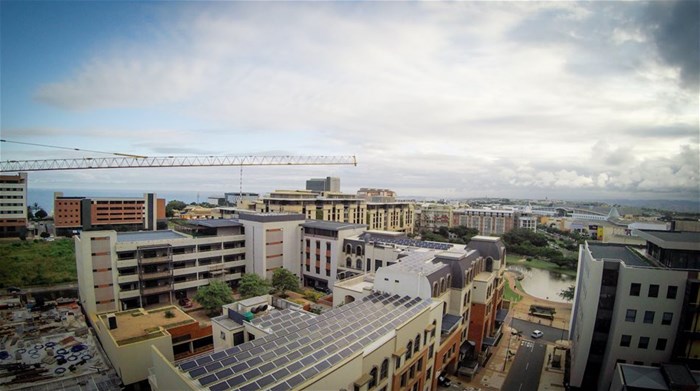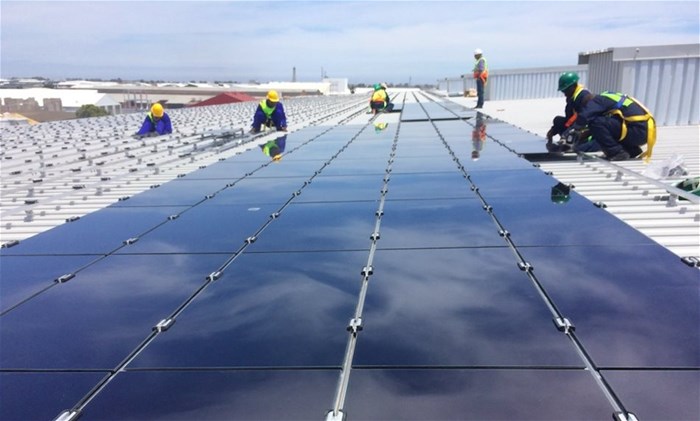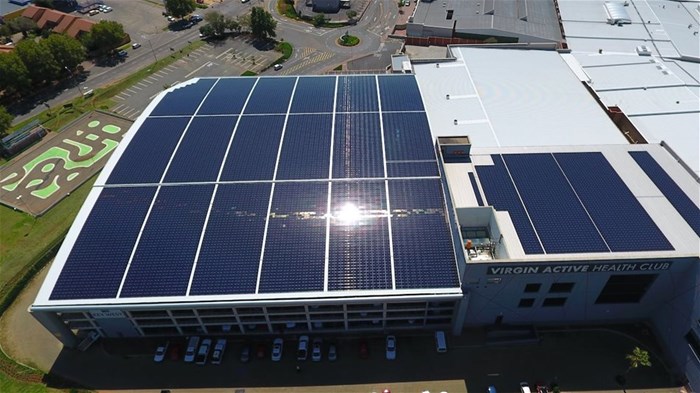
Top stories





Marketing & MediaWarner Bros. was “nice to have” but not at any price, says Netflix
Karabo Ledwaba 1 day

More news

Logistics & Transport
Maersk reroutes sailings around Africa amid Red Sea constraints

















With 13.5MWp of installed renewable energy generation across two dozen rooftop and carport solar plants and several MWp currently under construction, together with 332MW of generation potential from 330-plus backup generators, Growthpoint is helping to keep the lights on at nearly 3,000 South African businesses, big and small.
“At least 1,053 shops, 833 office tenants and 38 industrial tenants are in a position to continue operating through load shedding as a direct result of Growthpoint’s national energy management programme. In addition, all of the nearly 1,000 tenants of the V&A Waterfront, which Growthpoint co-owns, have full access to backup power from the precinct’s 48 generators,” reports Estienne de Klerk, Growthpoint Properties SA CEO.
“In this way, Growthpoint is helping much of SA Inc avoid business disruption during power outages and, in the process, safeguarding businesses, jobs and livelihoods,” adds De Klerk.
Growthpoint provides generator backup power to just over 70% of its office portfolio by gross lettable area, offering standby power for a whopping 1.2 million square metres of offices with 223 generators, where state-of-the-art technology has been implemented to monitor diesel levels. It also has a supply chain of in-house capabilities and external providers working to keep them fuelled and operating.
In the remaining 30% of office space, most tenants have their own power solutions, or buildings are in areas that do not experience major load shedding, for instance, parts of Pretoria and Cape Town, near national key points. There are some office buildings without generators, and Growthpoint is reassessing these requirements.

At industrial properties, tenants generally use their own generators, however, Growthpoint provides backup power across three industrial parks in its portfolio, accommodating multiple tenants in 84,153sqm.
Nine of Growthpoint’s malls have 100% backup power generation, with the tenth currently being added. At shopping centres, the complexity of the electrical reticulation often doesn’t allow a single source of backup power across an entire mall. Where this is the case, Growthpoint provides standby power to common areas. Larger retailers often have their own systems, and smaller tenants are encouraged to use their own battery-powered uninterrupted power supply (UPS).
“We know that fast food, sit-down restaurants, and some service tenants are particularly impacted by load shedding. Wherever shopping centres are without 100% backup power but have additional standby capacity, to support these tenants we are adding them to shopping centres’ backups where possible,” notes de Klerk.
While this goes a long way to help address the immediate need to power thousands of businesses, it comes at a cost – a significant capital outlay, a substantial monthly diesel bill, and the toll that fossil fuels have on the environment.
Growthpoint spent just over R47m on diesel to power all its buildings in the six months from July to December 2022. The monthly bill topped R10m in both October and December 2022 and was just short of this figure in November. The V&A Waterfront independently spent R14.8m on diesel over the same period.
“The costs are substantial, but the burden is mostly shared, with tenants paying for their own additional diesel consumption costs,” confirms De Klerk.
A big concern is the environmental impact of load shedding, which is forcing businesses to burn diesel at unprecedented rates. As with other businesses, this weighs on Growthpoint’s strategy to be carbon neutral by 2050 and counteracts its environmental goals.

Growthpoint launched an innovative programme of green building and green energy well over a decade ago. To replace electricity generated by fossil fuels with renewable energy in its portfolio, Growthpoint has already invested in 13.5MWp of solar generation capacity and plans to double this by June 2023.
“Our investment in solar power reduces our reliance on the national grid. There is a great need for this right now and amping up our investment in solar makes perfect sense for our strategic, operational and environmental, social and governance (ESG) goals,” says De Klerk.
Of its 24 solar installations, half are at office and mixed-use properties, nine at shopping centres and three at industrial buildings. However, retail installations represent the highest capacity by far, accounting for a combined 9.4MWp.
Growthpoint’s largest solar installation undertaken this year is the 2.5MWp plant at Paarl Mall in the Western Cape, which is paired with a 4.5MWh battery system to form a hybrid renewable energy and storage system. This is the first battery system of its size to be used at a shopping centre in South Africa, and Growthpoint is currently evaluating battery backup for other properties in its portfolio.
With 13.9MWp of solar projects in various phases of construction, Growthpoint is on track to achieve its target of 27.4MWp of installed solar by its 30 June 2023 financial year end and by adding potential solar projects to this list on an ongoing basis, Growthpoint is helping to chart the way forward for renewable energy in commercial real estate in South Africa and its tenants.